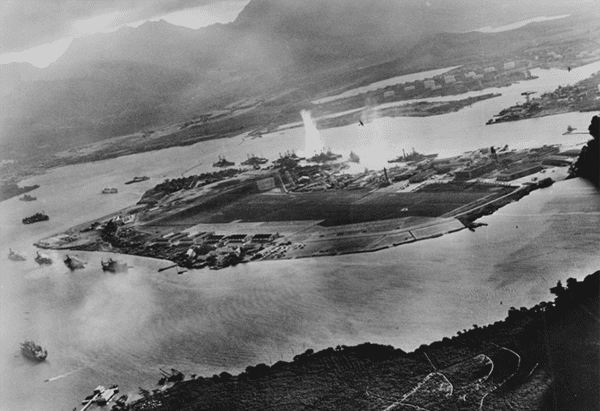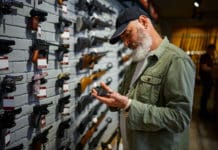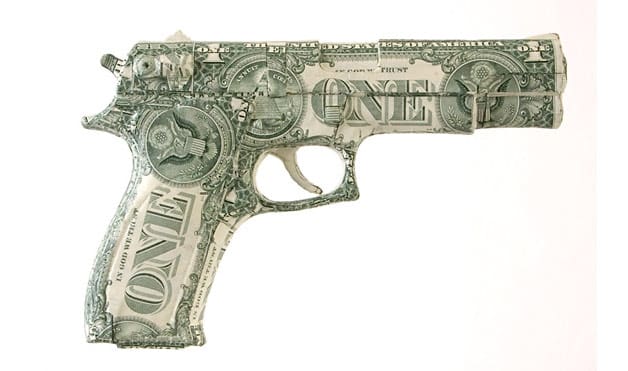
Today, as we honor the few surviving sailors and naval aviators from the Battle of Pearl Harbor, now 75 years in our collective past, people in gun rights circles will repeat the (apocryphal) words of Vice Admiral Yamamoto Isoruku, commander of the IJN Combined Fleet that carried out the attack.
You cannot invade the mainland United States. There would be a rifle behind every blade of grass.
Whether or not Yamamoto actually said this (Donald M. Goldstein, Professor of Public and International Affairs at the University of Pittsburgh claims that it’s bogus; others claim that the quote can be found in a letter to Ryoichi Saskakawa from Yamamoto stored in the files of Gordon W. Prange, the personal historian for Gen. Douglas MacArthur,) the quote illuminates something important.
It is true that the ready availability of rifles plus the knowledge and will to use them would have made any attempted occupation of the American homeland difficult. Indeed, resistance to the Japanese militarists was strong even in the Philippine Islands, whose residents were deprived of the Second Amendment, thanks in no small part to the racist Insular Cases.
It is also true that — the Philippines, Guam, and Attu notwithstanding — Yamamoto’s dark prophesy never came to pass. For Americans, World War II was less a war of homeland defense, and more a two-front expeditionary war in which industrial output was critical. It was a fight where massed armies faced each other in a meat-grinder overseas, where divisions would be smashed for small territorial gains, and entire cities bombed to the ground. (For those who really want to know what it was like to be a cog in the war machines, a good place to start is Paul Fussel’s Wartime. Warning: Fussel pulls no punches.)
How much did being a nation where riflemen waited behind every blade of grass matter in a war where (whatever the qualities of the equipment and soldiers — and they were both considerable,) T-34s prevailed over the Panzers in no small part because there were simply more of them ready to go? Where carrier air wings smashed battleships? Where Douhet-style air armadas devastated Dresden, Ploiești, Tokyo, and Royan? Where submarines torpedoing merchant ships brought Britain to her knees and Japan to the ground? Where the war was brought to an end by two individual aircrews delivering two individual bombs on two separate cities?
Ironically, the places in World War II where the partisan rifleman played an important independent role were not places where American riflemen were deployed in quantity: Indochina, Burma, Yugoslavia, the Warsaw ghettoes.
Today, in sharp contrast, we face a conflict where the rifleman – or perhaps I should say the pistol-man – actually might be decisive. As the attack by yet another terrorist drawing inspiration from the Islamic faith at Ohio State University last week demonstrated, the enemy we face today poses a distributed threat; he lies in repose among us until such time as he finds inspiration. The enemy gets its strength in part because it can tap into the faith of a certain segment of followers of one of the world’s great religions.
For all the heat generated this year about building a southern wall or banning Muslim immigrants from entering the country, those steps wouldn’t stop all terrorist attacks. Trying to filter anyone who might be susceptible to the siren call of jihad-fueled terror is a fool’s game for much the same reason that trying to disarm the American people is: communications are too cheap and easy, borders are too porous. Even if the USA was turned into a giant police state, people would slip through. Religious ideas, after all, are more portable and concealable even than guns or drugs. No, this is a long-term game of carrot-and-stick persuasion, played out for a mass audience.
Cognizant of these facts, the wisest course of action for most Americans outside of the political realm would be to take steps to prepare to deal with such an attack – to help be that stick. It isn’t enough to simply stay alert, or to carry a firearm — although I’d argue both of those steps are necessary components. Training to be competent in self-defense is important. Each of us should think through what we would do in case the defecation hits the oscillation ahead of time, because the moment of crisis is the worst time to come up with a plan.
In reality, those are steps that everyone should take anyway, until such time that humans universally become angels and crime is eradicated. But the good thing is that preparing for one particular vector of violence helps you prepare for others. In this conflict, the armed person who has the skill and will to fight — might actually be decisive, as in Texas last year when a traffic cop with a Glock managed to score hits on the attackers at a distance.
In this war where everyone from airplane passengers to nightclub partiers are first responders, the Second Amendment actually means more for national defense now than it did in the Big One.
We really do live in interesting times.
(Apologies to the late Louis Awerbuck for the use of his euphemism.)




Watching “The Final Countdown”… To commemorate the 75th Anniversary…. That and the fact that my son was born on December 7th makes this a hallowed day.
That’s a great movie!
You cannot invade the mainland United States today either. There would be a metrosexual taking a selfie behind every blade of grass while digging for a safe space and crying for his mommy.
Don’t forget the ponies.
This generation makes for good concealment and with obesity being what it is, some may qualify as cover.
My father survived the attack on Pearl Harbor. (He had been blown into the drink and had a big chunk of shrapnel pulled from his head). They patched him up and shipped him back out to the fleet only to have seven more ships sank from beneath his feet). (Boatswain’s Mate 1st Class, Underwater Demolition Team/Navy Rifle Team). Blowing Japanese troop trains in tunnels on the Japanese coast and committing acts of sabotage and demolition were heroism that I’ll never forget. Later, he went on to serve in the Korean War. I will always remember his acts of heroism and valor.
I was a simple Aviation Machinist’s Mate (Jet) stateside during the last days of the Vietnam War, but my father was a true Naval hero!
Hats off to your father. I’m sure the pride you have in him was reciprocated. It is for men like him that I displayed the stars and stripes today.
Freedom ain’t free. People have to stand at the walls in peace and war. It’s an absolutely vital and absolutely thankless task.
Our cities haven’t been flattened by bombs. Our roads haven’t been clogged by refugees running in fear. And the men(and women) nowadays that ensure this will not happen get precious little thanks for their service.
Next time you praise a service member and something less than a man spouts off about their “job” and “pay” and they knew the drill when they signed on, yada, yada, yada. Remember, when was the last time an American city was destroyed and it’s people made refugee’s?
1864, various cities in the South. Even then, that was more limited in scope than Stalingrad or Dresden.
My uncle Bob survived Pearl Harbor. Ironically because he went to church (never saw him go to a church). He never said a word about it except that…but at least WWII was a “good war”. No moral relativism. And perusing this musing makes we want that rifle…RIP Uncle Bob.
We simply can’t comprehend this, and younger folks even less. I had two uncles who were draftees in WW2. They never talked about it. One in the Pacific, the other I believe in Italy. Whatever they did, they did. My mother, who was single at the time of the War, told me about moving in with her brother’s wife while he went off to the Army to help her make ends meet. They planted Victory Gardens and to the day she died, my mother would not plant another vegetable. When her brother, my uncle, talked about the atomic bomb, he talked about it from the perspective of being an artillery sergeant on one of the invasion ships expected to land troops in Japan. For him, it was a gift. Late in life, he and my aunt visited Japan as tourists. We cannot even imagine.
I don’t think we have every blade of grass covered just yet, but the latest statistics on NICS checks give me some encouragement.
The past eight years have created a lot of entitled special snowflakes who couldn’t fight if they had to. But the rest of us certainly are better equipped than we used to be.
You would be surprised how fast the snowflakes will melt when faced with adversity. Regardless of the lib indoctrination when shove comes they’ll cover and aline. Seeing death corrects ones vision, works the brain stem and clarifies ones views quite well.
“The past eight years have created a lot of entitled special snowflakes who couldn’t fight if they had to.”
Like any war time recent years have also helped to create a portion of the younger generation(s) that has members that are tough, smart, battle hardened and know the enemy intimately. The military, intelligence services and LE are not the exclusive purview of people currently over 50. Those who are in the “snowflake” category are basically bullet sponges whether they know it or not. It’s always been that way we’ve just been lucky enough that most people in the West these days haven’t learned that harsh lesson in their lifetime and have forgotten the lesson learned by previous generations.
It’s also worth noting that not everyone in the 1940’s was a Sgt. Basilone/Chesty Puller/Gen. Patton kill-’em-all-and-break-their-shit type of America loving badass with a hardon for killing Japs and Krauts. There were draft resisters (distinctly different from sincere conscientious objectors), peaceniks and general light-in-the-loafers types back then too. The difference was that they were not celebrated. They were scorned by a country that actually sacrificed quite a lot on every front of the war, including the home front, and generally posterity has forgotten that those pansies were our countrymen.
*GySgt. Basilone.
Growing up, I was surrounded by WWI vets. One of my closest friends and mentors was a scientist at a research institute. One day he showed me an old photo of a P40 with a collection of crew and pilots standing in front. Turned out the guy on the end was my friend. He was a fighter pilot, starting in the Pacific in P40’s and ending up in Europe flying P51’s. He served throughout the entire war, surviving air combat from the earliest days until the end in 1945. That, in itself, was an amazing accomplishment. Like many of his generation, he never really talked much about his wartime experiences although when I asked he laughed a bit and told me about flying photo recon over Hainan Island . . . and watching the Zero’s take off and start climbing up to engage him while he was turning away at full throttle! As with many warriors, he was not the kind of person to brag and you’d never, ever, guess he’d done what he did unless he told you.
One campaign where individual riflemen made a difference was the “Thousand Mile War” in the Aleutian Islands of Alaska. Fascinating reading of men basically cut loose from military bureaucracy and stupidity to wreck havoc upon the Japanese invaders (yes, the Japanese invaded American soil in WWII) who Japan sent forth to freeze and die as a feint to draw attention away from their Midway Island campaign.
Starting to like you DG. Can I borrow your backhoe?
I learned about Castner’s Cutthroats when I lived in AK. Those guys were the ultimate recon/scout force for that environment.
” (For those who really want to know what it was like to be a cog in the war machines of the various combatants, a good place to start is Paul Fussel’s Wartime. Warning: Fussel pulls no punches.)”
‘With the Old Breed: At Peleliu and Okinawa’ by Eugene Sledge is another good one.
https://www.amazon.com/Old-Breed-At-Peleliu-Okinawa-ebook/dp/B000VMFDW2
Just reading about the combat conditions on those islands will age you.
Like living for months in a wet, muddy foxhole in the steamy summertime and every minuet of every day smelling the bodies of your buddies decomposing around you…
“Helmet for My Pillow: From Parris Island to the Pacific” by Robert Leckie is another must-read.
Those two books, along with the story of Sgt. Basilone (he never wrote a book since he died on Iwo Jima) are what The Pacific is based on and not loosely based on either.
The books are good. So’s the show. Worth a gander. The DVD set, like Band of Brothers is worth the price just for the special features/interviews etc. The show itself is probably not at all suitable for children but for those with kids YMMV based on the age and maturity of your offspring.
I bought both books after watching the series. Watched a good bit of it again with my 8 year old son this year, fast forwarding through parts that were particularly inappropriate for his age. I loaned out Helmet For My Pillow to a co-worker former Marine that served in Iraq and brought a good bit of shrapnel home with him. Never did get it back, but I can get another copy.
EDIT – link should read:
https://www.amazon.com/Old-Breed-At-Peleliu-Okinawa/dp/0891419195
And a link for Ralph’s suggested ‘Helmet for My Pillow’ is:
https://www.amazon.com/Helmet-My-Pillow-Parris-Pacific/dp/0553593315/ref=pd_sbs_14_t_0/154-5960451-4207043?_encoding=UTF8&psc=1&refRID=KNY9RT9YE1VT654MHBW4
There is no “old breed”. Each generation forges men who step into the arena and get the nasty job of killing job done.
So what ol’ Yamo was saying is, an armed citizenry is a deterrent to a military invasion. Who’d have thunk it. One more reason in support of the second amendment.
My Dad was at Pearl Harbor. Never talked about it. Some of those guys SHOULD have talked about it, but that’s the way it was.
One comment he did make was that the planes flew so low he could see the silly grins on the pilots faces.
One guy I knew was a young Chinese boy in Singapore when Japan invaded. He had scars till he died, mental and physical. Those guys had it rough
My father enlisted in the Marines 75 years ago tomorrow. Peleliu, Guadalcanal, New Guninea and a couple other God-forsaken places are on his service record. He’s been gone 45 years but I choose to remember December 8th rather than his DOD.
“He’s been gone 45 years but I choose to remember December 8th rather than his DOD.”
Nice.
“A veteran is someone who at one point in their life, wrote a blank check made payable to The United States of America for any amount, up to and including their life.”
Comments are closed.